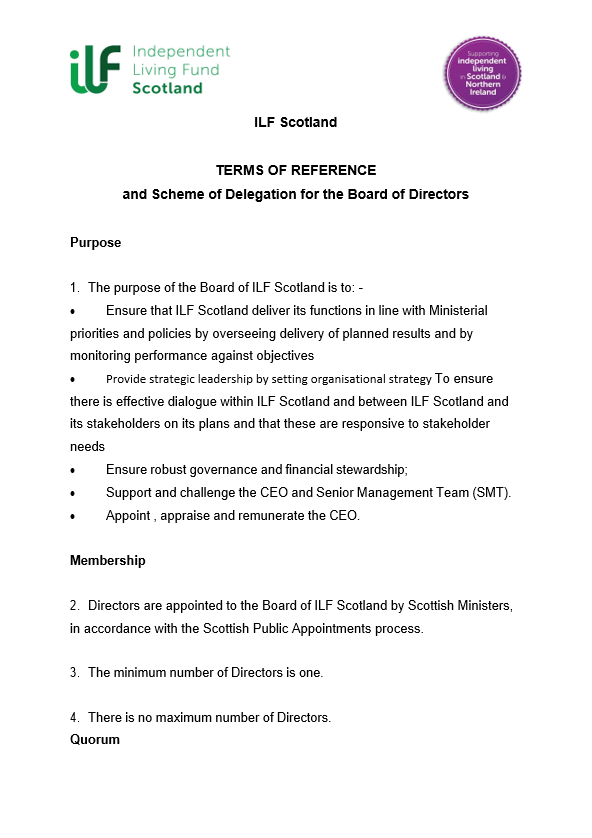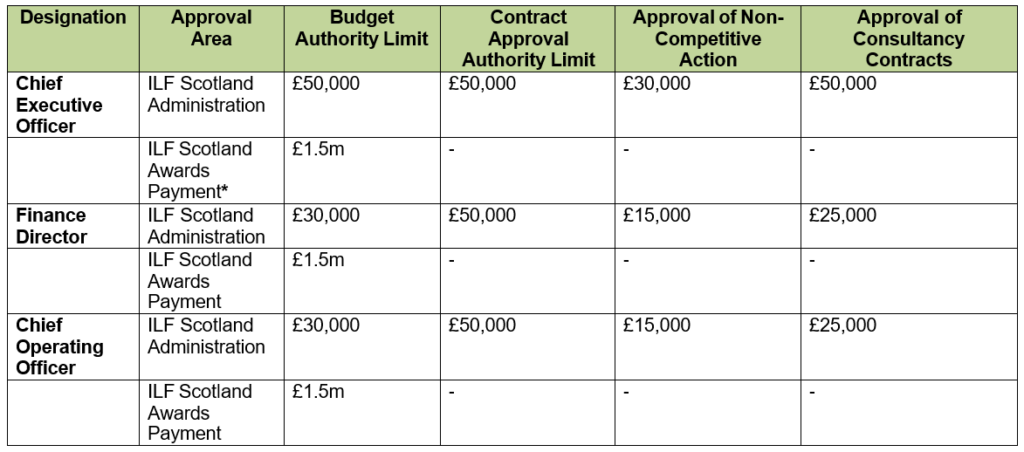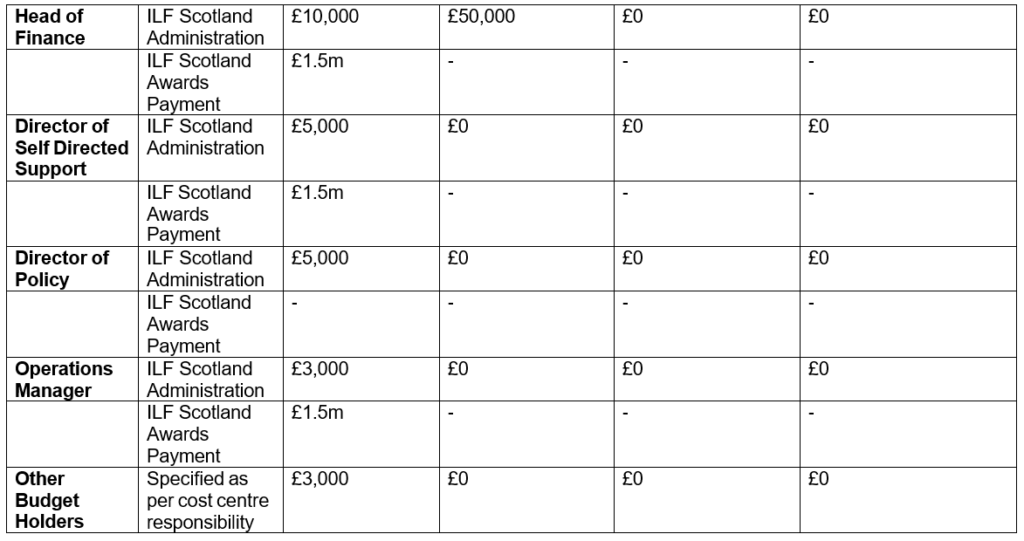TERMS OF REFERENCE and Scheme of Delegation for the Board of Directors
Purpose
- The purpose of the Board of ILF Scotland is to: -
- Ensure that ILF Scotland deliver its functions in line with Ministerial priorities and policies by overseeing delivery of planned results and by monitoring performance against objectives
- Provide strategic leadership by setting organisational strategy To ensure there is effective dialogue within ILF Scotland and between ILF Scotland and its stakeholders on its plans and that these are responsive to stakeholder needs
- Ensure robust governance and financial stewardship;
- Support and challenge the CEO and Senior Management Team (SMT).
- Appoint , appraise and remunerate the CEO.
Membership
2. Directors are appointed to the Board of ILF Scotland by Scottish Ministers, in accordance with the Scottish Public Appointments process.
3. The minimum number of Directors is one.
4. There is no maximum number of Directors.
Quorum
5. A quorum for meetings of the Board is three Directors, one of which must be the Chair or Vice Chair of the Board.
Schedule and Frequency of Meetings
6. An annual schedule of meetings will be drawn up by the Company Secretary and agreed with the Chair of the Board.
7. A minimum of four formal Board meetings will be held per year. Additional meetings may be required and will be determined by the Chair in consultation with the CEO.
8. In addition to formal Board meetings, at least one annual Board development session will be held, as determined by the Chair and CEO.
9. Agendas, minutes and papers will, where possible, be circulated to Board Directors at least one week before the agreed meeting date.
Committees
10. The Board will establish sub-committees to deal with specific areas of business.
11. As a minimum, the Board will establish and maintain an Audit and Risk Committee (see Annex A) and a Remuneration Committee (see Annex B).
12. Sub-committees must be chaired by an ILF Scotland Director, but may contain
- Independent external members – in attendance (as required and at the discretion of the Board);
.
- Independent external members will be selected by the Board in consultation with the CEO.
13. Sub-committees will operate in accordance with their specific Terms of Reference as determined by the Board, and the sub-committee Chair will report formally to the Board via minutes of their proceedings.
Standing Agenda
14. The standard agenda for each Board meeting is as follows: -
- Declarations of interest
- Minutes of previous meeting
- Matters arising from previous meeting
- Quarterly strategic report and performance
- Audit Committee feedback
- Remuneration committee feedback
- Health and Safety
- MiCase & PQQ’s
- AOB
Reservation of Powers
15. Decisions on the following matters are reserved to the Board of Directors:
a. Regulation
- Maintain a register of interests for all Directors;
- Receive minutes and reports from sub-committees, considering and acting on recommendations as appropriate;
- To review the risk register
- To review the operation against regulatory requirements such as Health & Safety, Finance and Audit
- Establish and periodically review Terms of Reference for the Board and its sub-committees.
- Urgent decision making will be taken on a case by case basis at the discretion of the Chair.
·
b. Appointments
- Establish and review the membership of all sub-committees of the Board;
- Appoint Director(s) of the Board to each sub-committee;
- Appoint any non-Directors of the Board to each sub-committee;
- Make recommendations to, and co-operate with, ILF Scotland’s Scottish Government sponsor team in relation to Board succession planning and future Board appointments.
c. Planning
- Establish the overall strategic direction of ILF Scotland;
- Lead the organisations approach to strategic planning in partnership with the CEO;
- Approve ILF Scotland’s strategic plan for submission to Scottish Government;
- Develop and approve, with the Accountable Officer, the annual report and accounts;
- Approve the annual ILF Scotland budget for recommendation to Scottish Government.
d. Audit
- Audit Scotland will appoint external auditors therefore the Committee will only be in a position to note the appointment;
- With regard to internal auditors the Executive Team will follow the strict SG procurement and tender process. The Committee will again only be in the position to note the appointment;
- Receive the annual Management Letter from the external auditor, noting its contents and agree necessary actions following advice from the Audit Committee;
- Receive the annual report from the internal auditors, noting its contents and agree necessary actions following advice from the Audit Committee.
Delegation of Powers
16. Sub-committees
The delegated authority of sub-committees is set out in the Terms of Reference for each sub-committee (found at Annex A and B) as determined and reviewed by the Board of Directors.
17. Chief Executive Officer
- All powers which have not been retained or reserved by the Board or its sub-committees will be exercised on behalf of ILF Scotland by the CEO. The CEO will be accountable to the Board for the exercise of these powers:
- The CEO of ILF Scotland is designated by the Scottish Government’s Principal Accountable Officer as the Accountable Officer for ILF Scotland, in accordance with the Public Finance and Accountability (Scotland) Act 2000.
- As the Accountable Officer, the CEO is personally responsible to the Scottish Parliament for the appropriate management of the public funds of which s/he has charge, and for the day-to-day operations and management of the company.
- The CEO will keep the Board informed of all significant matters in relation to the functions of the Accountable Officer.
- The CEO will keep the Board informed of the operation of ILF Scotland awards policies, including any identified risks and amendments.
- The CEO may delegate functions to appropriate members of the SMT, who will be accountable to the CEO for the exercise of these delegated functions.
18. ILF Scotland Employees – Financial Authorities
- The delegated financial authority of specific members of ILF Scotland is set out in the Scheme of Delegation at Annex C.
Annex A
Terms Of Reference for the Audit and Risk Committee
1. The Board of ILF Scotland has established an Audit and Risk Committee as a Sub-committee of the Board to support them in their responsibilities for issues of risk, control and governance and associated assurances through a process of constructive support and challenge.
Membership
2. All members of the Audit and Risk Committee are appointed by the Board. Membership will include: -
- non-executive directors;
- independent external members (as required and at the discretion of the Board);
- at least one member of the committee will have recent and relevant financial experience.
3. The Chair of the Audit and Risk Committee will be appointed by the Board from within the Board’s membership.
4. The Chair of the Board of Directors will not be a member of the Audit and Risk Committee, but may attend from time to time for information purposes.
5. The Audit and Risk Committee will be provided with a secretariat function by ILF Scotland.
Reporting
6. The Audit and Risk Committee will formally report in writing to the Board and Accountable Officer after each meeting. A copy of minutes of the meeting will normally form the basis of the report.
7. The Audit and Risk Committee will provide the Board and Accountable Officer with an Annual Report, timed to support finalisation of the accounts and the Statement on Internal Control, summarising its conclusions from the work it has done during the year.
Responsibilities
8. The Audit and Risk Committee will advise the Board and Accountable Officer on: -
- the strategic processes for risk, control and governance and the Statement on Internal Control;
- the accounting policies, the accounts, and the annual report of the organisation, including the process for review of the accounts prior to submission for audit, levels of error identified, and management’s letter of representation to the external auditors;
- the planned activity and results of both internal and external audit;
- the adequacy of management response to issues identified by audit activity, including external audit’s management letter/report;
- the effectiveness of the internal control environment including the Scheme of Delegation and Delegated Authority to Commit and Approve Expenditure limits;
- assurances relating to the corporate governance requirements for the organisation;
- the business continuity and monitoring arrangements in place.
- proposals for tendering for either internal or external audit services
- anti-fraud policies, whistle-blowing processes, and arrangements for special investigations.
9. The Audit and Risk Committee will also periodically review its own effectiveness and report the results of that review to the Board and Accountable Officer.
Rights
10. The Audit and Risk Committee may: -
- co-opt additional members for a period not exceeding one year to provide specialist skills, knowledge and experience; and
- procure specialist ad-hoc advice at the expense of the organisation, subject to budgets agreed by the Board or Accountable Officer.
Access
11. The Head of Internal Audit and the representative of External Audit will have free and confidential access to the Accountable Officer and the Chair of the Audit and Risk Committee.
Meetings
12. The procedures for meetings are: -
- the Audit and Risk Committee will meet at least four times a year. The Chair of the Audit and Risk Committee may convene additional meetings, as they deem necessary;
- a minimum of 2 members of the Audit and Risk Committee will be present for the meeting to be deemed quorate; (it’s only the Directors who make quorum)
- Audit and Risk Committee meetings will normally be attended by the Accountable Officer, the Head of Finance, and the Chief Operating Officer/Depute CEO.
- an Internal and/or external Audit representative may attend at the request of the Chair of the Audit and Risk Committee;
- the Audit and Risk Committee may ask any other officials of the organisation to attend to assist it with its discussions on any particular matter;
- the Audit and Risk Committee may ask any or all of those who normally attend but who are not members to withdraw to facilitate open and frank discussion of particular matters;
- agendas, minutes and papers will be circulated to Board Directors at least one week before the agreed meeting date;
- the Board or Accountable Officer may ask the Audit and Risk Committee to convene further meetings to discuss particular issues on which they want the Committee’s advice;
- urgent decision making will be taken on a case by case basis at the discretion of the Chair.
Information Requirements
13. For each meeting the Audit and Risk Committee will normally be provided with: -
- Quarterly Financial Management report
- a Risk Register report highlighting any significant changes;
- a progress report from Internal Audit summarising: -
- work performed (and a comparison with work planned);
- key issues emerging from Internal Audit work;
- management response to audit recommendations;
- significant changes to the audit plan;
- report updating any right off of debts
- any resourcing issues affecting the delivery of Internal Audit objectives;
14. As and when appropriate the Committee will also be provided with: -
- a progress report from the External Audit representative summarising work done and emerging findings.
- proposals for the Internal Audit plan;
- the Internal Audit Strategy;
- the Head of Internal Audit’s Annual Opinion and Report;
- the draft accounts of the organisation;
- the draft Statement on Internal Control;
- a report on any changes to accounting policies;
- External Audit’s management letter/report;
- a report on any proposals to tender for audit functions;
- assurance on co-operation between Internal and External Audit.
15. The above list suggests minimum requirements for the inputs which should be provided to the Audit and Risk Committee. In some cases more may be provided.
Annex B
TERMS OF REFERENCE Remuneration Committee
1. The Board of ILF Scotland has established an Remuneration Committee as a Sub-committee of the Board to support them in their responsibilities for issues of remuneration and governance and associated assurances through a process of constructive support and challenge.
Membership
2. All members of the Remuneration Committee are appointed by the Board. Membership will include: -
- non-executive directors;
- at least one member of the committee will have recent and relevant HR/ legal experience
- independent external members (as required and at the discretion of the Board);
3. The Chair of the Remuneration Committee will be appointed by the Board from within the Board’s membership.
4. The Remuneration Committee will be provided with a secretariat function by ILF Scotland.
Reporting
5. The Remuneration Committee will formally report in writing to the Board and Accountable Officer after each meeting. A copy of minutes of the meeting will normally form the basis of the report.
6. The Remuneration Committee will provide the Board and Accountable Officer with an Annual Report, timed to support finalisation of the accounts and the Statement on Internal Control, summarising its conclusions from the work it has done during the year.
Responsibilities
7. The Remuneration Committee is commissioned by the ILF Scotland Board and Accountable Officer to ensure the Committee:
- Approves the ILF Scotland’s reward policy framework that ensures the most talented staff, are recruited, retained and motivated to deliver results in line with the organisation’s vision and strategy.
- Agrees all terms and conditions of employment for the Chief Executive, including job description, job evaluation, terms of employment, basic pay and benefits
- Reviews and determine the total reward package each year of the Chief Executive Officer taking account of performance and report accordingly to Board of Directors and Scottish Government.
- Reviews and determine the total and specific reward package of staff taking account of performance report accordingly and Board of Directors and Scottish Government.
- Oversees severance or early retirement arrangements for staff taking account of Scottish Government guidance.
- Ensures compliance with the Public Sector Pay Remit policy and process.
- Provides support to the executive team on issues within their remit, but on which advice may be sought.
- Provides advice on any staffing or employee experience issue which may be a matter of policy, but on which advice may be sought before taking to the board.
- Review and approve Board succession planning, working with the Public Appointments Team as appropriate.
- Deals with any such other relevant matters as may be referred to the Remuneration Committee by the Board of Directors.
18. The Remuneration Committee will also review its own effectiveness and report the results of that review to the Board and Accountable Officer every other year.
Rights
9. The Remuneration Committee may: -
- co-opt additional members for a period not exceeding a year to provide specialist skills, knowledge and experience; and
- procure specialist ad-hoc advice at the expense of the organisation, subject to budgets agreed by the Board or Accountable Officer.
Access
10. The Head of Internal Audit and the representative of External Audit will have free and confidential access to the Accountable Officer and the Chair of the Remuneration Committee.
Meetings
11. The procedures for meetings are: -
- the Remuneration Committee will meet at least two times a year. The Chair of the Remuneration Committee may convene additional meetings, as s/he deems necessary;
- a minimum of 2 members (Board Directors) of the Remuneration Committee will be present for the meeting to be deemed quorate;
- Remuneration Committee meetings will normally be attended by the Accountable Officer, the Chief Operating Officer and Head of Business Services.
- an Internal and/or external Audit representative may attend at the request of the Chair of the Audit Committee;
- the Remuneration Committee may ask any other officials of the organisation to attend to assist it with its discussions on any particular matter;
- the Remuneration Committee may ask any or all of those who normally attend but who are not members to withdraw to facilitate open and frank discussion of particular matters;
- agendas, minutes and papers will be circulated to Board Directors at least one week before the agreed meeting date;
- the Board or Accountable Officer may ask the Remuneration Committee to convene further meetings to discuss particular issues on which they want the Committee’s advice.
- urgent decision making will be taken on a case by case basis at the discretion of the Chair.
Information Requirements
12. For each meeting the Remuneration Committee will normally be provided with:
- The financial information relevant to the remit of the committee.
- Any relevant HR and OD data.
- Any relevant retention issues.
- The recommended spread of incremental award across posts.
- Proposed awards for individuals taking account of the above.
13. As and when appropriate the Committee will also be provided with: -
- any plans for the proposed change in structure of ILF Scotland;
- a report on any significant changes to the reward policy;
14. The above list suggests minimum requirements for the inputs which should be provided to the Remuneration Committee. In some cases more may be provided.
Annex C
Scheme of Delegation and Authorised Expenditure
* NB two people are required to process and authorise each award payment.
b) Scheme of delegation - Finance




